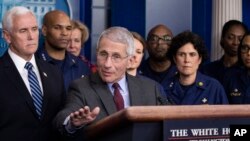President Donald Trump’s top disease expert says some of what Trump expresses in coronavirus briefings “could lead to some misunderstanding” about the facts.
Dr. Anthony Fauci, head of the National Institute of Allergy and Infectious Diseases, has become a household name and a familiar face because of the daily White House coronavirus briefings.
In an interview with Science magazine, Fauci said Trump listens. He said while he doesn’t disagree with the president in substance, he would express it differently.
“He goes his own way. He has his own style. But on substantive issues, he does listen to what I say,” Fauci said.
But the doctor says there isn’t much he can do when Trump makes a misstatement.
“I can’t jump in front of the microphone and push him down. OK, he said it. Let’s try and get it corrected for the next time,” Fauci said.
At a news conference last week, Trump falsely claimed the Food and Drug Administration had approved using an anti-malarial drug to treat patients with the coronavirus.
On Monday, the Banner Health system in the western state of Arizona said a man died and his wife was in critical condition after ingesting an additive used to clean fish tanks that is also found in the medication Trump touted.
Fauci told the magazine that he will never call the coronavirus the “China virus,” which is what Trump consistently calls it during the briefings.
The doctor indicated that these daily White House press gatherings make him a bit uneasy because of relatively large number of people at the podium and reporters in the room.
“I keep saying, ‘Is there any way we can get a virtual press conference?’ Thus far, no. But when you’re dealing with the White House, sometimes you have to say things one, two, three, four times, and then it happens. So, I’m going to keep pushing.”
Fauci said that Vice President Mike Pence, the head of the coronavirus task force, is much more of a “bear” than Trump in keeping people apart.
Fauci said it is premature to try to figure out why the U.S. was underprepared for the outbreak. But for now, he said people need to follow the fundamental guidelines in preventing the spread while maintaining what he calls a “delicate balance” when considering more drastic steps.
“There’s a compromise. If you knock down the economy completely and disrupt infrastructure, you may be causing health issues, unintended consequences, for people who need to be able to get to places and can’t. You do the best you can.”




